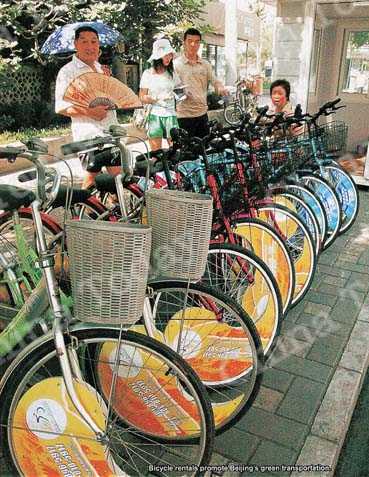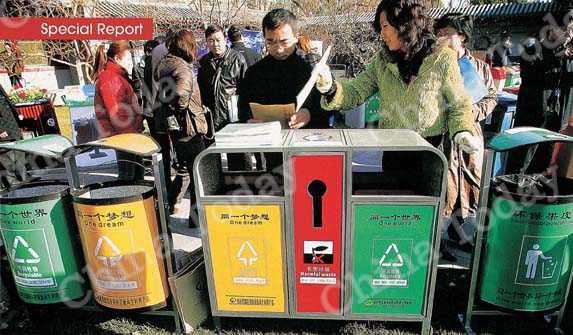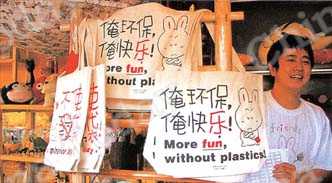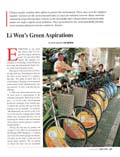Chinese people continue their efforts to protect the environment. These days even the slightest negative variance on the environmental index is cause for national concern. Many motorists voluntarily forgo driving their vehicles in the knowledge that exhaust fumes and particulate matter are major culprits of air pollution. They opt instead for the environmentally friendly, not to mention physical exercise conducive, bicycle.
EVERYONE in my work unit knows that I've begun bicycling to and from work," 43-year-old Li Wen assures this reporter. Li's company is on Beijing's Jintai Road; he lives near the International Trade Center, about four kilometers away.
Driving to work used to be a 25-min-ute trip each way. Switching to a bicycle has more or less halved Li's commuting time. "It's great to know that I'm contributing to Beijing's environmental conservation while simultaneously taking exercise," Li says, with obvious satisfaction.
Li Wen was a keen motorist for over 10 years prior to participating in the volunteer-promoted "Bicycling in Beijing - no car for a day" environmental protection campaign some months ago. "I joined the activity off my own bat, hoping to set an example," Li explains. "We abandoned our cars for a day in favor of the bicycle, hoping others might follow suit. It seemed the best way of lessening the threat to the environment while easing current pressure on public transportation."
During the four-day air quality test (August 17-20, 2007) in anticipation of the Beijing 2008 Olympics, 1.3 million cars were left in their garages on alternative days, on the basis of odd and even license plate numbers. The air quality on those four days was an acceptable Grade II, according to Beijing Municipal Environmental Protection Department statistics.


Trashcans made from green materials.
Save a Kilowatt for Future Generations
Li Wen does not belong to any environmental group, but takes pride in maintaining an environmentally friendly home, both indoors and outdoors. He unfailingly unplugs his electrical appliances after use and, on the advice of friends, has switched to unleaded gas. He never leaves his motor running when the car is stationary and avoids abrupt acceleration, braking and driving at unnecessarily high speed.
"My mother set me a fine example," Li Wen says. "I don't come from an affluent family background. My mother trained all of us to turn out the lights when leaving the room. I didn't understand why at first, and then thought she was being overly thrifty. I later realized that she was actually saving on the earth's resources, as well as the family budget."
Li Wen does not belong to any environmental group, but takes pride in maintaining an environmentally friendly home, both indoors and outdoors.
Li Wen has since learned that approximately 80 percent of the electricity generated in China originates in thermo-power, whose main resource is coal. It takes 350 grams of standard coal to generate just one kilowatt. As Li points out, "In addition to depleting a nonrenewable energy resource, we pay a high ecological price for every kilowatt we use. In that sense, every kilowatt saved is of societal as well as ecological significance."
Li Wen and his co-environmentalists' efforts are exactly what the Chinese government advocates. China's 2006 GDP was just 5.5 percent of the world total. Its energy consumption, however, represented 15 percent, its steel consumption 30 percent, and its cement consumption 54 percent of the world total. Energy consumption to this excessive extent causes serious problems within an unconstrained mode of economic development. The Chinese government consequently made 2007 its year of "energy saving and emission reduction," to which all were asked to contribute. Li Wen's company, among thousands of others, was instructed not to dip below an indoor temperature of 26 degrees Celsius during the summer months. The result was a 2.78 percent reduction in GDP energy unit consumption in the first half of 2007 compared to 2006, according to statistics.
Efforts Indoors and Out
Li Wen takes a micro approach to environmental protection that extends beyond turning off the lights before leaving the room, or unplugging appliances when they are not in use.
Li Wen always takes a canvas shopping bag with him on trips to the supermarket. He seldom, if ever, asks for a plastic bag or a disposable fast-food container. Neither does he use disposable toothbrushes. These are boycotts to emulate. Plastic, whether in the form of packing materials, fast-food containers, knives, forks, cups, bowls, soft-drink bottles, or disposable tablecloths, takes an entire millennium to decompose. During this time it inhibits soil cultivation by 30 percent, and is a potential source of underground water pollution.
"My environmental protection awareness is inspired by a good friend of mine," Li Wen reflects. "He loves mountain climbing, and often organizes groups of friends to join him in climbing the hills surrounding Beijing at weekends. He always takes a bag with him and deposits in it any litter that has been left by other climbers or picnickers. While others are so exhausted after scaling a hill they can barely carry their own stuff, he brings down a bag of garbage in addition to his own pack."
Li Wen follows his friend's suit by doing everything in his power to protect the environment. "There are actually millions of small things we can do in daily life to save the environment," Li Wen continues, "like making sure faucets are properly turned off, and not leaving water running while brushing our teeth, washing our face or soaking laundry. Water can also be "recycled." That used for laundering can be re-used to mop the floor or flush the toilet, and water that has been used to rinse vegetables is fine for watering plants. Water in which rice has been washed or noodles boiled functions, with a little added sodium bicarbonate, as effectively as detergent in removing grease." Li realizes that he and other ordinary citizens have no control over industrial air and water pollution. "Shutting down a pollutant business is the government's duty," he says, "but everyone can do something in daily life to conserve a clean water resource."
"Be equally concerned with things outside as well as inside the home," Li Wen advises. "With the participation of millions of households in environmental protection efforts, we can make our world a safer place to live in."

Zhouzhou the Bunny hawking his cyber space icon emblazoned, environmentally-friendly shopping bags. Photos by China Foto Press
Measures Adopted in Beijing to Limit Air Pollution
Between 70 and 80 percent of air pollutants originate in automobile exhaust, according to Beijing Environmental Protection Bureau statistics. Motor vehicle ownership has ballooned over the past few years. As at May 26, 2007, there were more than 3 million registered motor vehicles in the capital, a number that increases at the rate of 1,500 units per day.
The Beijing municipal government has adopted multiple measures in an effort to limit air pollution from vehicle emissions. They include boosting development of the public transportation system by annually adding 1,000 new buses to the total fleet. There are currently more than 13,000 buses on the road. As from 2007, the government cut bus fares by 60 percent, and as much as 80 percent on some routes. Its RMB 2 subway ticket is the cheapest nationwide. Beijing was the first city in the country to heighten its motor vehicle exhaust requirements to Euro II standards in 2003. It has also instituted stricter exhaust emission checks. Beijing has sped up construction of a desirable transportation infrastructure, involving ring roads, connections, hubs and track transportation. By the year 2008, track transportation in Beijing will have extended from its current 100 to 300 kilometers. The municipality has adopted 50 additional measures to improve its environment. It took 4,000 old buses and 30,000 taxis out of service in 2005. The same year, more than 109 pollutant iron and steel, cement, chemical, and paper-making plants were relocated outside Beijing, and 680 coalmines were shut down. These measures have steadily improved Beijing's air quality. The "Blue Sky" project that began in 1998 (blue sky referring to Grade II or above air quality) has indeed brought the capital more blue-sky days: there were 165 in 2000; 185 in 2001; 203 in 2002; 230 in 2005; and 241 in 2006.


 Copy Reference
Copy Reference 